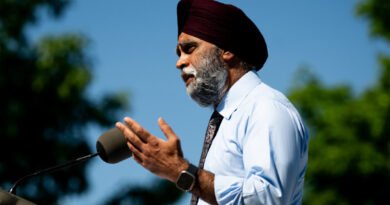Prospect of Syria Pullout Revived After Trump’s Election Reversal in First Term
Hundreds of U.S. troops remain stationed in Syria despite the incoming president’s earlier pledge to bring them back home.
News Analysis
With Donald Trump set to return to the White House, speculation has mounted about how he will deal with the complex situation in Syria, where U.S. troops have been deployed—occasionally coming under attack—since 2015.
During his first term in office, Trump repeatedly pledged to bring U.S. troops stationed in Syria back home, but the promised withdrawal never materialized.
“Some troops were withdrawn during Trump’s first term, but between 900 and 1,000 remained,” Omer Onhon, Turkey’s last ambassador, told The Epoch Times. “Whether the issue will come up again in his second term remains to be seen.”
Onhon served as Turkey’s ambassador to Syria from 2009 until 2012, when Ankara severed ties with Damascus.
Hundreds of U.S. troops are stationed in northeastern Syria, near the border with Turkey, and in parts of the country’s east near Iraq.
Syria describes the continued U.S. military presence as an illegal occupation and a flagrant breach of its sovereignty and territorial integrity.
U.S. forces remain in Syria—and in Iraq—as part of an American-led international coalition ostensibly tasked with fighting the ISIS terrorist group.
Said to be an offshoot of the al-Qaeda terrorist group, ISIS overran broad swaths of territory in both Syria and Iraq in 2014.
In 2017, the group was largely wiped out in Iraq and suffered the same fate in Syria two years later.
During his first term in office, Trump repeatedly voiced his intention to pull all U.S. troops out of Syria, asserting that ISIS had been eradicated.
The promised withdrawal was fiercely opposed by a host of prominent U.S. political figures from both sides of the aisle.
They argued that a U.S. withdrawal from Syria would only serve to reinvigorate ISIS, damage U.S. credibility, and leave Washington’s Kurdish allies out in the cold.
“Trump announced his decision to withdraw, but appeared to do so without consulting U.S. officials involved in Syria—at the Pentagon and elsewhere,” Onhon said.
Objections by high-ranking U.S. officials, he added, “were based on concerns about leaving the area to the Iranians and the Russians.”
Since 2015, Russia and Iran have also maintained forces in Syria—operating with the invitation and consent of the Syrian government—to combat ISIS and support the regime of President Bashar al-Assad.
“Arguments were also made [by U.S. officials] about preventing a resurgence of ISIS and the need to continue fighting the group,” Onhon said.
Despite mounting institutional opposition, Trump’s promised withdrawal appeared to move forward.
Since then, the Pentagon has insisted that U.S. troops remain in Syria for the express purpose of defeating—or at least containing—the terrorist group.
“We left troops behind [in Syria], only for the oil,” he said in November 2019 at the White House before a meeting with Turkish President Recep Tayyip Erdogan.

U.S. President Donald Trump and Turkish President Recep Tayyip Erdogan at a joint press conference in the East Room of the White House, on Nov. 13, 2019. Jim Watson/AFP via Getty Images
Washington’s Kurdish Allies
Days after Trump won a second term in office, Turkish Defense Minister Yasar Guler suggested that the incoming U.S. president would try—again—to withdraw U.S. troops from Syria.
The prospect of a U.S. withdrawal from Syria will likely be hindered by complex regional politics involving Turkey—a longstanding NATO member—and Washington’s Kurdish allies in Syria.
U.S. troops deployed in Syria work closely with the Syrian Democratic Forces (SDF), an alliance of groups cobbled together to help the U.S.-led coalition fight ISIS.
Since 2015, the SDF, which is armed and supported by Washington, has carved out a sizable enclave in oil-rich eastern Syria where Damascus exerts little control.
Over the past 40 years, the PKK has carried out numerous terrorist attacks in Turkey, on both military and civilian targets, resulting in thousands of deaths.
In recent years, Turkey has carried out several offensives in northern Iraq, where the PKK is based, with the aim of “neutralizing” the terrorist group.
It has also conducted incursions into northern Syria, where Turkish forces continue to battle the YPG, the PKK’s Syrian offshoot.
Despite the PKK’s close association with the YPG, Washington views the latter as a key ally in Syria, with U.S. officials frequently calling the group a “reliable partner” in the fight against ISIS.
“The U.S. supports one terrorist group to fight another terrorist group,” Onhon said, echoing a longstanding Turkish complaint. “Washington’s ties to the YPG have long strained [U.S.-Turkey] relations. Without resolving this issue … tensions between the two countries will persist.”
This week, Turkish Foreign Minister Hakan Fidan said that Ankara was “constantly reminding our American counterparts that they need to stop the cooperation they have with the terrorist [YPG] organization in Syria.”
Onhon was quick to point out that Turkey and the United States are NATO allies, describing the two countries as “strategic partners.”
“The expectation in Turkey is that President Trump, who is aware of this sensitivity, will address the issue so as to rebuild trust with its strategic ally,” he said. “Whether he is willing—or able—to do so, however, remains an open question.”
On Nov. 8, Erdogan said that he planned to discuss the prospect of a U.S. withdrawal from Syria with Trump, who has not broached the issue—in public at least—since his recent electoral victory.
Reuters contributed to this report.





